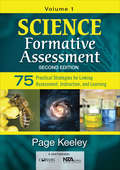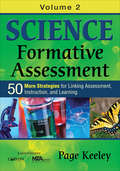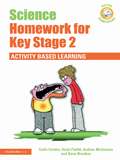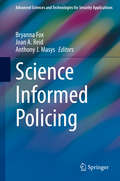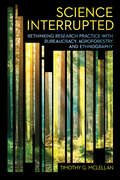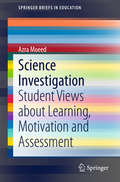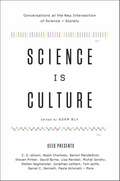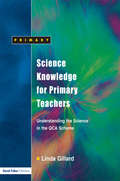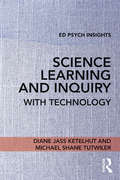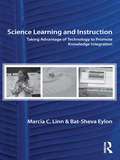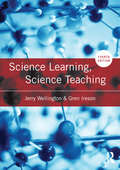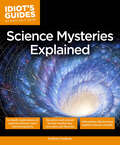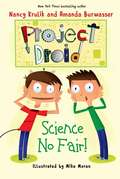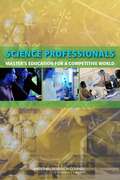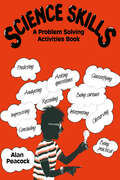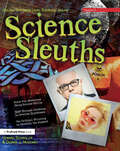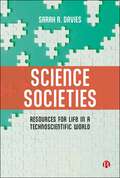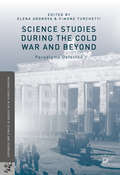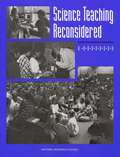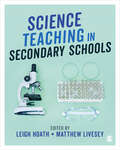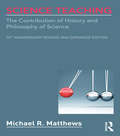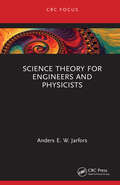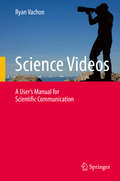- Table View
- List View
Science Formative Assessment, Volume 1: 75 Practical Strategies for Linking Assessment, Instruction, and Learning
by Page D. KeeleyFormative assessment informs the design of learning opportunities that take students from their existing ideas of science to the scientific ideas and practices that support conceptual understanding. Science Formative Assessment shows K-12 educators how to weave formative assessment into daily instruction. Discover 75 assessment techniques linked to the Next Generation Science Standards and give classroom practices a boost with: Descriptions of how each technique promotes learning Charts linking core concepts at each grade level to scientific practices Implementation guidance, such as required materials and student grouping Modifications for different learning styles Ideas for adapting techniques to other content areas
Science Formative Assessment, Volume 2: 50 More Strategies for Linking Assessment, Instruction, and Learning
by Page D. KeeleyDeepen scientific understanding with formative assessment! Only by really knowing what your students are thinking can you design learning opportunities that deepen content mastery and meet their individual needs. In this highly engaging resource, internationally respected expert Page Keeley shares 50 new techniques to pinpoint student understanding before, during, and after instruction. In addition to promoting best practices in the classroom, the techniques shared here support learning and link instruction to the Next Generation Science Standards. These flexible assessments can be used with any science curriculum, along with: Practical strategies for use throughout the instruction cycle Considerations for implementation and suggestions for modification An explanation of how each technique promotes learning
Science Homework for Key Stage 2: Activity-based Learning (Active Homework)
by Colin Forster Vicki Parfitt Andrea McGowanScience Homework for Key Stage 2 is a unique resource for busy teachers - a selection of ‘pencil-free’, hands-on activities, aligned with the National Curriculum Programmes of Study and with clear links to the topics set out in the QCA scheme of work for KS2 science, that teachers can use as extension activities or give to pupils as homework to do with members of their family or friends. Each of the activities encourages the pupils to learn through discussion and through practical activities utilising everyday resources. Each activity is quick and easy for pupils and teachers to manage, and includes: a learning aim, full, clear instructions and discussion points tasks to foster collaboration and partnership between pupils, parents and teachers photocopiable resources. A refreshing approach for teachers and pupils, these activities will foster enthusiasm for learning and inspire pupils' interest in science.
Science Informed Policing (Advanced Sciences and Technologies for Security Applications)
by Anthony J. Masys Bryanna Fox Joan A. ReidThe current policing landscape has seen the rise in serious and organized crime across the globe. Criminals are innovating in real-time leveraging cyber, social media, enhanced surveillance to support their activities. In so doing, the criminal landscape has become transnational whereby collaborative networks have flourished thereby creating greater complexity and novel threats for the international policing community. As new threats to local, regional, national and global security are emerging, leveraging science and technology innovations has become more important. Advances in big data analytics, cyber forensics, surveillance, modeling and simulation has led to a more data driven, hypothesis generated and model informed approach. Novel science and technology innovations are presented in this edited book to provide insights and pathways that challenges the emerging and complex criminal threat landscape by supporting policing operations.
Science Interrupted: Rethinking Research Practice with Bureaucracy, Agroforestry, and Ethnography (Expertise: Cultures and Technologies of Knowledge)
by Timothy G. McLellanScience Interrupted examines how scientists in China pursue environmental sustainability within the constraints of domestic and international bureaucracies. Timothy G. McLellan offers a theoretical framework for analyzing the formal procedural work of Chinese bureaucracy—work that is overlooked when China scholars restrict their gaze to the informal and interpersonal channels through which bureaucracy is often navigated. Homing in on an agroforestry research organization in southwest China, the author takes the experiences of the organization's staff in navigating diverse international funding regimes and authoritarian state institutions as entry points for understanding the pervasiveness of bureaucracy in contemporary science. He asks: What if we take the tools, sensibilities, and practices of bureaucracies seriously not only as objects of critique but as resources for re-thinking scientific practice? Extending a mode of anthropological research in which ethnography serves as source of theory as well as source of data, Science Interrupted thinks with, and not only against, bureaucracy. McLellan shows that ethnographic engagement with bureaucracy enables us to imagine more democratic and more collaborative modes of scientific practice.
Science Investigation
by Azra MoeedThis book reports the findings of an interpretive case study of the phenomenon of science investigation (science inquiry) from students' perspective. Data were collected from a class of twenty-four Year 11 students in a middle size, co-educational New Zealand school, through Science Laboratory Environment Inventory, student questionnaires, focus group interviews and classroom observations. The participants provided some insightful comments about their learning of science investigation. Illustrative examples highlight; what students found motivational and what demotivated them, what and how they learnt through carrying out science investigation, and how internal assessment influenced their motivation to learn and learning. The connectedness between the complexities of learning science investigation and how motivation, and assessment influenced these 15 year old students' learning is discussed.
Science Is Culture: Conversations at the New Intersection of Science + Society
by Adam BlySeed magazine brings together a unique gathering of prominent scientists, artists, novelists, philosophers and other thinkers who are tearing down the wall between science and culture.We are on the cusp of a twenty-first-century scientific renaissance. Science is driving our culture and conversation unlike ever before, transforming the social, political, economic, aesthetic, and intellectual landscape of our time. Today, science is culture. As global issues—like energy and health—become increasingly interconnected, and as our curiosities—like how the mind works or why the universe is expanding—become more complex, we need a new way of looking at the world that blurs the lines between scientific disciplines and the borders between the sciences and the arts and humanities.In this spirit, the award-winning science magazine Seed has paired scientists with nonscientists to explore ideas of common interest to us all. This book is the result of these illuminating Seed Salon conversations, edited and with an introduction by Seed founder and editor in chief Adam Bly. Science Is Culture includes:E. O. Wilson + Daniel C. DennetSteven Pinker + Rebecca GoldsteinNoam Chomsky + Robert TriversDavid Byrne + Daniel LevitinJonathan Lethem + Janna LevinBenoit Mandelbrot + Paola AntonelliLisa Randall + Chuck HobermanMichel Gondry + Robert StickgoldAlan Lightman + Richard ColtonLaurie David + Stephen SchneiderTom Wolfe + Michael GazzanigaMarc Hauser + Errol Morris
Science Knowledge for Primary Teachers: Understanding the Science in the QCA Scheme
by Linda GillardSpecifically structured around the QCA schemes of work, this book focuses upon developing the science subject knowledge of the reader up to the standards needed for QTS. It provides: clear explanations of the major science "concepts" a primary teacher needs to teach the National Curriculum effectively illustrations of how this knowledge can be applied in everyday teaching and planning direct links within each chapter to the QCA schemes of work review questions and discussion points to aid understanding and comprehension.
Science Learning and Inquiry with Technology (Ed Psych Insights)
by Diane Jass Ketelhut Michael Shane TutwilerWhen implemented effectively, technology has great potential to positively connect with learning, assessment, and motivation in the context of K–12 science education and inquiry. Written by leading experts on technology-enhanced science learning and educational research, this book situates the topic within the broader context of educational psychology research and theory and brings it to a wider audience. With chapters on the fundamentals of science learning and assessment, integration of technology into classrooms, and examples of specific technologies, this concise volume is designed for any course on science learning that includes technology use in the curriculum. It will be indispensable for student researchers and both pre- and in-service teachers alike.
Science Learning and Instruction: Taking Advantage of Technology to Promote Knowledge Integration
by Bat-Sheva Eylon Marcia C. LinnScience Learning and Instruction describes advances in understanding the nature of science learning and their implications for the design of science instruction. The authors show how design patterns, design principles, and professional development opportunities coalesce to create and sustain effective instruction in each primary scientific domain: earth science, life science, and physical science. Calling for more in depth and less fleeting coverage of science topics in order to accomplish knowledge integration, the book highlights the importance of designing the instructional materials, the examples that are introduced in each scientific domain, and the professional development that accompanies these materials. It argues that unless all these efforts are made simultaneously, educators cannot hope to improve science learning outcomes. The book also addresses how many policies, including curriculum, standards, guidelines, and standardized tests, work against the goal of integrative understanding, and discusses opportunities to rethink science education policies based on research findings from instruction that emphasizes such understanding.
Science Learning, Science Teaching: Contemporary Issues And Practical Approaches
by Gren Ireson Jerry WellingtonNow fully updated in its fourth edition, Science Learning, Science Teaching offers an accessible, practical guide to creative classroom teaching and a comprehensive introduction to contemporary issues in science education. Aiming to encourage and assist professionals with the process of reflection in the science classroom, the new edition re-examines the latest advances in the field and changes to the curriculum, and explores the use of mobile technology and coding, and its impact on ICT in science education. With extra tasks integrated throughout the book and a brand new chapter, ‘Working scientifically’, to help develop learners’ investigative skills, key topics include: • The art and craft of science teaching. • The science curriculum and science in the curriculum. • Planning and managing learning. • Inclusive science education. • Laboratory safety in science learning and teaching. • Language and numeracy in science teaching and learning. • Computers and computing in science education. • Citizenship and sustainability in science education. Including points for reflection and useful information about further reading and recommended websites, Science Learning, Science Teaching is an essential source of support, guidance and inspiration for all students, teachers, mentors and those involved in science education wishing to reflect upon, improve and enrich their practice.
Science Mysteries Explained: In-Depth Explorations of Natural Science’s Most Fascinating Facts (Idiot's Guides)
by Anthony FordhamIdeal for the armchair science enthusiast, Idiot's Guides: Science Mysteries Explained takes a question/answer-based approach to teach readers a wide variety of topics in Earth Science, Life Science, Chemistry, Physics, and Cosmology. Using helpful full-color illustrations and expert information, this book features 130 fascinating questions and answers to satisfy any scientist wannabe.
Science No Fair!: Project Droid #1 (Project Droid)
by Nancy Krulik Amanda Burwasser Mike MoranHilarious story about a slightly crazy science and engineering experimentLogan Applebaum tries to keep his new robot cousin, Java, a secretLogan’s science fair rivals steal Java, and Logan worries they’ll discover Java’s true identity If you thought your science fair experience was nerve-wracking, try being Logan Applebaum. One day, his inventor mother declares that she made a new robot cousin for Logan, Java. Java might be incredibly bright, but he’ll also be quite the handful. Logan had a picture of how the third grade would go. Java was not part of that picture. As the third grade science fair gets closer and the kids prepare for their experiments, Logan thinks Java will come in handy. He can at least help Logan beat the Silverspoon twins, who always win everything. Unfortunately for Logan, the twins Sherry and Jerry steal Java as their partner. Even worse, these kids become suspicious. Can Logan work quickly enough to keep a crazy experiment from becoming a crazier disaster? Join mother-daughter author duo Nancy Krulik and Amanda Burwasser as they introduce the comedic pair of Logan and Java. This first installment of their Project Droid #1 story reminds readers of Amelia Bedelia with a delightful modern edge. Science No Fair! is an excellent pre- bedtime book choice.
Science Plus: Technology & Society, Level Red
by Editors at Holt Rinehart WinstonLearn more about how science interacts with society in this textbook.
Science Professionals: Master's Education For A Competitive World
by National Research Council of the National AcademiesWhat are employer needs for staff trained in the natural sciences at the master's degree level? How do master's level professionals in the natural sciences contribute in the workplace? How do master's programs meet or support educational and career goals? Science Professionals: Master's Education for a Competitive World examines the answers to these and other questions regarding the role of master's education in the natural sciences. The book also focuses on student characteristics and what can be learned from efforts underway to enhance the master's in the natural sciences, particularly as a professional degree. This book is a critical tool for Congress, the federal agencies charged with carrying out the America COMPETES Act, and educational and science policy makers at the state level. Additionally, anyone with a stake in the development of professional science education (four year institutions of higher education, students, faculty, and employers) will find this book useful.
Science Skills: A Problem Solving Activities Book
by Alan PeacockThis is a practical book for pupils, designed to teach the basic skills of scientific investigation and problem solving. With an emphasis on skills not facts, it is practical in approach, describing over 100 activities. No specialised apparatus is required and the investigations it covers are flexible enought to relate to any science course.
Science Sleuths: Solving Mysteries Using Scientific Inquiry (Grades 6-9)
by Howard Schindler Dennis J. MucenskiBuilding on the growing public interest in forensics, the three cases featured in Science Sleuths: Solving Mysteries Using Scientific Inquiry merge science and literacy, requiring students to be critical and active readers as they conduct their investigation. Beginning with an evaluation of the crime scene photos, the student investigators will analyze lab reports, phone messages, and interviews to extract key information. Students will sort through the evidence to formulate their initial hypothesis (being alert to red herrings) as they work to identify the person responsible for each crime. Students are given additional sets of information as they make their way through the case, requiring them to reformulate their initial hypothesis until they arrive at a final conclusion. The students' final write-up consists of a chart explaining the means, motive, and opportunity for each of the suspects, in addition to a thorough analysis of the evidence and a recreation of the case. Eventually, students are able to determine which suspect should be charged with the crime!Students will:solve fun mysteries using science skills,sort through evidence to develope hypotheses, anduse critical thinking to identify the suspect.Grades 6-9
Science Societies: Resources for Life in a Technoscientific World
by Sarah R. DaviesWhat role do science and technology play in society? What is the nature of expert knowledge? What is science’s relation to democracy? This introduction to science, technology, and society answers these questions, and more, by exploring contemporary research on topics such as expertise, activism, science policy, and innovation. It offers a comprehensive resource for considering the place that science and technology have in contemporary societies, and the roles that they can and should play. Accessible to a non-specialist audience, it draws on a rich range of cases and examples, from nuclear activism in India to content moderation in Kenya. Framing science as always social, and society as always shaped by science and technology, it asks: what worlds do we want science and technology to bring into being?
Science Studies during the Cold War and Beyond
by Simone Turchetti Elena AronovaThis book recounts how during the Cold War the study of science moved to the centre of academic through the creation of the new discipline of science studies. In this way the volume charts the importance of these studies for the trajectory of Cold War nations through the elaboration of new national science policies and the transnational dialogue, even across the Iron Curtain, between key scholars involved in shaping their trajectory. By examining how a new group of intellectuals was mobilized by state administrators to convincingly set up a discipline deemed to have major repercussions on the advancement of science in developed and undeveloped nations. Secondly, by putting the study of science at the centre of the dialogue (as well as the confrontation) between nations and Cold War blocs. The volume thus shows how an often considered arcane field of enquiring had in fact major implications for the understanding and fostering of Cold War science.
Science Teaching Reconsidered: A Handbook
by Committee on Undergraduate Science EducationEffective science teaching requires creativity, imagination, and innovation. In light of concerns about American science literacy, scientists and educators have struggled to teach this discipline more effectively. Science Teaching Reconsidered provides undergraduate science educators with a path to understanding students, accommodating their individual differences, and helping them grasp the methods--and the wonder--of science.What impact does teaching style have? How do I plan a course curriculum? How do I make lectures, classes, and laboratories more effective? How can I tell what students are thinking? Why don't they understand? This handbook provides productive approaches to these and other questions.Written by scientists who are also educators, the handbook offers suggestions for having a greater impact in the classroom and provides resources for further research.
Science Teaching in Secondary Schools
by Leigh Hoath Matthew LiveseyThis book is your essential guide to secondary science teacher training and the early career years giving smart, practical advice on developing your classroom skills and deepening your knowledge of science education. Covering all major aspects of science teaching, including: planning and assessment, the power of subject knowledge, teaching tricky topics and health and safety in class and lab work, it will encourage you to develop an informed approach to allow you to shine as an early career teacher of science. Key features: · Real life examples of how important teaching principles work in practice · What to look for when observing others teaching · Reflective questions challenging you to engage with key ideas · Chapters linked to the Core Content Framework and Early Career Framework Leigh Hoath is a Senior Professional Practice Fellow at Leeds Trinity University. Matthew Livesey is a teacher of biology at Bradford Grammar School.
Science Teaching in Secondary Schools
by Leigh Hoath Matthew LiveseyThis book is your essential guide to secondary science teacher training and the early career years giving smart, practical advice on developing your classroom skills and deepening your knowledge of science education. Covering all major aspects of science teaching, including: planning and assessment, the power of subject knowledge, teaching tricky topics and health and safety in class and lab work, it will encourage you to develop an informed approach to allow you to shine as an early career teacher of science. Key features: · Real life examples of how important teaching principles work in practice · What to look for when observing others teaching · Reflective questions challenging you to engage with key ideas · Chapters linked to the Core Content Framework and Early Career Framework Leigh Hoath is a Senior Professional Practice Fellow at Leeds Trinity University. Matthew Livesey is a teacher of biology at Bradford Grammar School.
Science Teaching: The Contribution of History and Philosophy of Science, 20th Anniversary Revised and Expanded Edition
by Michael R. MatthewsScience Teaching explains how history and philosophy of science contributes to the resolution of persistent theoretical, curricular, and pedagogical issues in science education. It shows why it is essential for science teachers to know and appreciate the history and philosophy of the subject they teach and how this knowledge can enrich science instruction and enthuse students in the subject. Through its historical perspective, the book reveals to students, teachers, and researchers the foundations of scientific knowledge and its connection to philosophy, metaphysics, mathematics, and broader social influences including the European Enlightenment, and develops detailed arguments about constructivism, worldviews and science, multicultural science education, inquiry teaching, values, and teacher education. Fully updated and expanded, the 20th Anniversary Edition of this classic text, featuring four new chapters—The Enlightenment Tradition; Joseph Priestley and Photosynthesis; Science, Worldviews and Education; and Nature of Science Research—and 1,300 references, provides a solid foundation for teaching and learning in the field.
Science Theory for Engineers and Physicists
by Anders E. W. JarforsThis book is a concise hands-on guide that provides students a useful tool for a systematic approach to scientific inquiry.Science Theory for Engineers and Physicists provides a basic understanding of "the method" as a question and to understand how a reliable answer that can be validated is constructed. It covers the basic terminology and methods which are exemplified for ease of understanding for the reader. Testing of hypotheses and quantitative understanding of uncertainty and uncertainty propagation are also illustrated.The book is intended to be used with experimental work as a final or thesis project for undergraduate or graduate students who have not had prior experience in science theory or data handling and uncertainty.
Science Videos: A User's Manual For Scientific Communication
by Ryan VachonEffective science communication is no easy task. While the effective conveyance of technical knowledge presents formidable roadblocks to sharing scientific knowledge and discoveries, certain communication tools like video and film production help to bridge this gap. This user’s manual provides a complete set of easy-to-follow directions for video-making as well as tricks of the trade to leverage these skills to better inform the intended audience.
